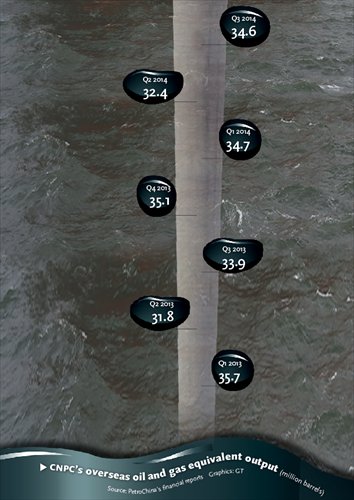

New exploration areas to help diversify sources of energy imports
China National Petroleum Corporation (CNPC), the country's largest oil and gas producer by annual output, is willing to participate in collaboration on Arctic oil and gas exploration, the Xinhua News Agency reported Tuesday, quoting an executive in the company.
International cooperation is needed in the Arctic oil and gas exploitation and CNPC could join in with its advantages, Sun Xiansheng, head of CNPC Economics & Technology Research Institute, said in a international conference in Norway, according to Xinhua.
CNPC has the capability for resource development in the Arctic and has established a cooperative relationship with a Russian corporation, Sun said.
According to a report on CNPC's website, the company signed a framework agreement in 2013 with Russia's Novateck Co to acquire a 20 percent stake in the country's Yamal liquefied natural gas (LNG) project which is located in the Arctic, a move of "great significance for collaboration on Arctic resource exploration and opening Arctic shipping lanes."
Both CNPC and CNPC Economics & Technology Research Institute refused to give further details about the projects and plans for exploring Arctic oil and gas when contacted by the Global Times Tuesday.
The Arctic region holds large, untapped gas and oil reserves, which may account for 30 percent of the planet's undiscovered natural gas reserves and 13 percent of the undiscovered oil, according to data from a science organization US Geological Survey, with most of the reserves being in Russian territory.
The abundant oil reserves have attracted a large amount of investment from around the world and it's not surprising that CNPC also has an interest in the area, Lin Boqiang, an energy expert from Xiamen University, told the Global Times on Tuesday.
But Lin also emphasized the tough challenges CNPC will face in the region, saying Arctic oil production is still at a nascent stage.
In April, 2014, Russian energy giant Gazprom shipped first batch of 70,000 tons of Arctic oil to European buyers from its Prirazlomnoye oil field located in the Arctic, marking the start of oil production and export from the Arctic area of Russia.
Compared with foreign firms, Chinese enterprises have an advantage in terms of exploration technology but are slightly behind Japanese and South Korean companies in opening Arctic shipping lanes for oil transportation, Yu Qing, a senior energy analyst with Shanghai-based CBI Research Center, told the Global Times Tuesday.
China usually imports oil and gas from the Middle East and Canada, and accelerating exploration in the Arctic will help diversify the sources of the country's oil imports and meet the increasing demand for oil, Yu said.
According to the US Energy Information Administration, China has become the world's second-largest consumer of oil and is projected to have become the largest net importer of oil in 2014.
"China's total oil and liquids production, the fourth-largest in the world, has risen by about 54 percent over the past two decades and serves only its domestic market. However, the production growth has not kept pace with demand growth during this period," the US Energy Information Administration said.
With a sharp decline in international oil prices, China's oil imports are expected to continue to increase in 2015 and overseas investment by China's oil and gas firms may also accelerate, Lin said.
CNPC rival Sinopec Group reportedly also has interest in the Arctic oil resources.
But compared with other Chinese oil producers such as Sinopec, CNPC has an advantage in production field, Lin said.
Copyright ©1999-2018
Chinanews.com. All rights reserved.
Reproduction in whole or in part without permission is prohibited.